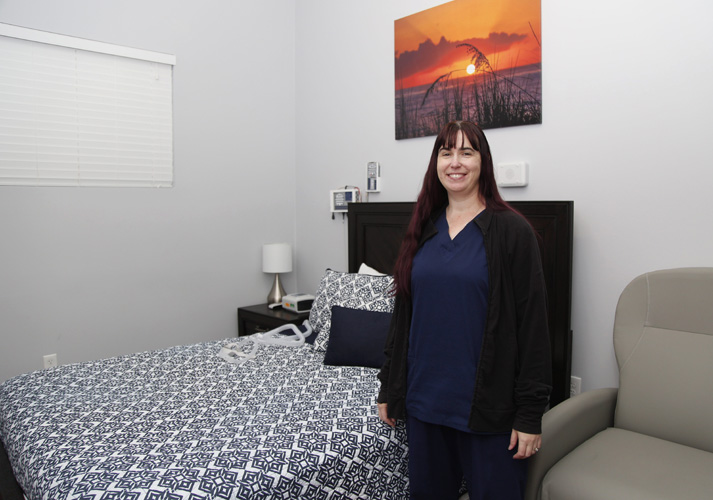
Having trouble sleeping lately?
There is plenty going on now to keep you tossing and turning at night, but for more than 50 million Americans, getting a good night’s sleep is next to impossible even in the best of times.
For those who suffer from chronic sleep disorders – including central, complex and obstructive sleep apnea, insomnia, restless leg syndrome and narcolepsy – medical sleep disorders can be far more than a mere annoyance.
They can be life-threatening.
Just ask Tina Wilbourne, the lead polysomnographer at Cleveland Clinic Indian River Hospital’s Sleep Disorders Center. She is in charge of performing the tests used to accurately diagnose a variety of sleep disorders by monitoring patients’ brain waves, blood oxygen levels, heart rates, breathing, and eye and leg movements during a sleep study.
“Some people with sleep disorders,” Wilbourne says, “will wake up [in the middle of the night] and they’re gasping for air or their heart is really racing fast and they think that it’s really just a bad dream, when, in fact, it’s their body trying to get them to breathe.”
Even if those people do manage to get back to sleep, Wilbourne says, many of them “will wake up and feel like they didn’t sleep at all. They don’t get a good rest, so they go through their whole next day being really sleepy or very fatigued. They have no energy and they just don’t want to do anything.”
That’s especially true of those with sleep apnea in its various forms.
According to Wilbourne, “there’s obstructive sleep apnea which is basically a collapse in your airway. It’s either in the nasal passages, in the back of the mouth area or down in the throat somewhere.
“Another type,” she continues, “is central sleep apnea, which in very simple terms is when your brain forgets to tell your body to breathe. So, there’s that sort of disconnect. And then the other type is complex, which is a mix of obstructive and central, and tends to be the hardest to treat.
“Obstructive sleep apnea,” she continues, “is the most common type of those three.”
The American Sleep Apnea Association adds that “80 percent of the cases of moderate and severe obstructive sleep apnea are undiagnosed,” and so, are not being treated.
That’s a big problem since it also states “obstructive sleep apnea, when left untreated, can lead to high blood pressure, chronic heart failure, atrial fibrillation, stroke and other cardiovascular problems. It is also associated with type 2 diabetes and depression.”
The American Psychiatric Association agrees and points out: “Sleep difficulties [like apnea] are linked to both physical and emotional problems.”
Sleep problems in general, and the various forms of sleep apnea in particular, the APA says, can contribute to – or exacerbate – a panoply of physical health and mental health conditions.
And that’s where Wilbourne and the Sleep Disorders Center come into play.
“We run all types of sleep studies here,” Wilbourne says. “We do the diagnostic study to find out if you have sleep apnea, both in lab and at home. And then we treat the sleep apnea that was found with C-PAP titration.
“We also do the daytime studies,” she explains. “There are two types of daytime studies. There’s MSLT, which to find out if a person has narcolepsy. Usually these people are sent to us because they’re falling asleep all the time. They can’t stay awake and that’s the suspicion, is that they have narcolepsy.
“We also do an MWT, which is maintenance of wakefulness test. It’s mostly ordered for people where it’s especially important that they stay [alert for] their jobs, like pilots, bus drivers, truck drivers, things like that.
“The Department of Transportation,” Wilbourne adds, “requires that people in those types of positions, if they have sleep apnea, must prove they can stay awake for their job.”
It’s simple. What you don’t know can hurt you and it might even kill you. So, if you or your partner or spouse think you might have some type of sleep disorder, talk to your primary care physician.
He or she may very well recommend a visit to the Sleep Disorders Center.
The Cleveland Clinic Indian River Hospital Sleep Disorders Center is at 3395 11th Court in Vero Beach. The phone number is 772-563-4403.



